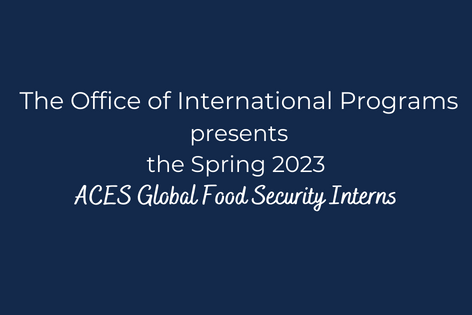ACES undergraduates work towards global food security as part of internship program

Through the innovative Global Food Security Interns program, selected undergraduates in the College of Agricultural, Consumer and Environmental Sciences (ACES) have the opportunity to work with faculty mentors on specific projects towards global food and nutrition security in low- and middle-income countries.
“The ACES food security internships allow undergraduates to get involved in international work earlier in their academic careers. These kinds of opportunities have traditionally been reserved for graduate students,” says Mary Arends-Kuenning, acting associate dean of international programs.
Specifically, the internships provide the selected students a salary for 8 to 15 weeks during the spring semester and additional funding to support the costs of adding a travel experience that is relevant to the internship. The students are nominated by faculty who have agreed to mentor these talented and motivated students as they help with existing research projects.
Congratulations to the ACES Spring 2023 Global Food Security interns:
- Emma Prybylski - junior in animal sciences, who is working with Phil Cardoso to evaluate dairy farming practices and assist with the International Food Security at Illinois Symposium.
- Brendon Carter, junior in agricultural and consumer economics, who is working with Hope Michelson to research and build a database on maize policy changes in African countries. Brendon’s internship was continued from 2022.
The internship also offers personal and professional development opportunities throughout the semester; for example, meeting with any distinguished guests who visit the campus, such as USAID administrators or notable alumni.
“Through this internship I’ve had the opportunity to learn about agriculture, economics, and current food issues in a hands-on way that goes beyond what I could learn in the classroom. For example, I wrote summaries on Tanzania’s import policies and price caps in the fertilizer market in support of Dr. Michelson’s research in this area. I prepared data visualizations on the perception of corruption by African farmers to see if it can explain fertilizer market failures,” Carter says.
“Recently, I have been helping Dr. Michelson and her graduate assistant Hanna Willwerth prepare data on Kenyan fertilizer transactions to see if prices have been rising more quickly in rural areas. I am very excited to continue the internship this semester and incredibly thankful for the opportunity.”
Hope Michelson, professor in agricultural and consumer economics and Carter’s mentor, says she appreciates the opportunity to have him work on documenting polices related to fertilizer pricing in Tanzania.
“Some of this work is quite detailed and involves matching fertilizers to type and aggregating and checking across space and time. It’s great to have him working with us,” Michelson notes.